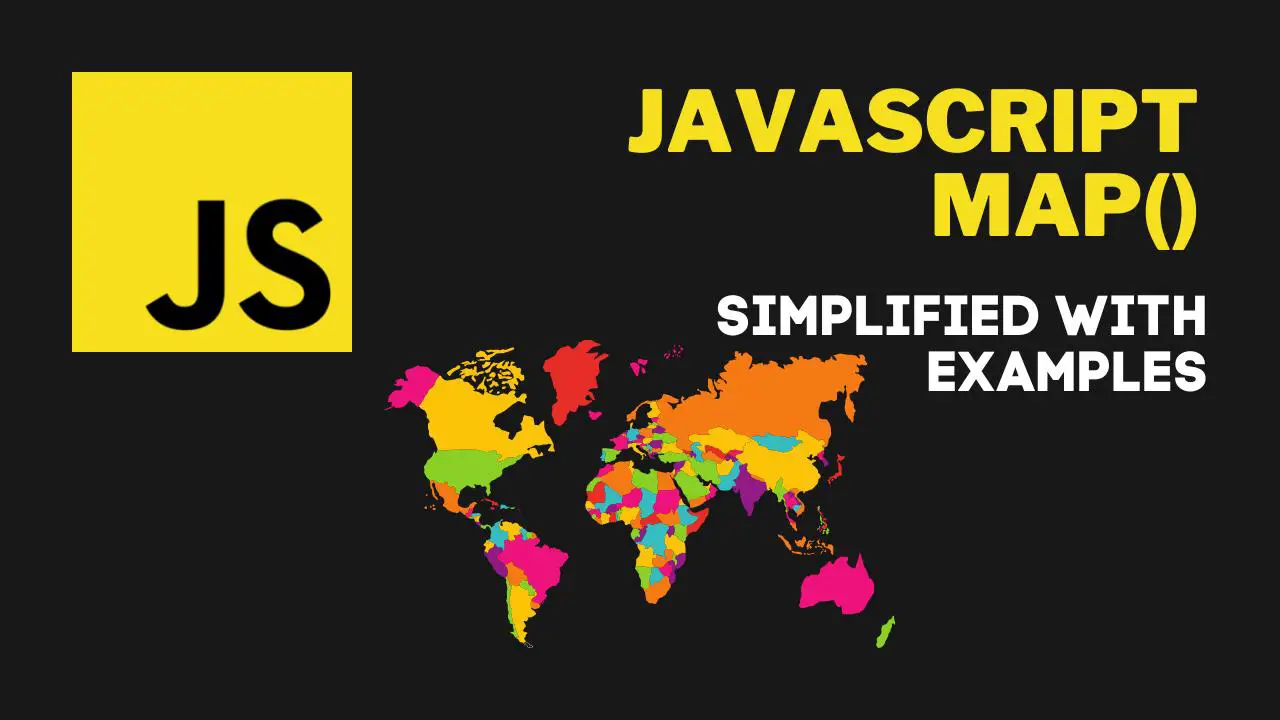The JavaScript map() function in JavaScript is a method that allows you to transform every element in an array into a new element, based on a provided function. This is a useful tool for creating a new array from an existing one, and can be used to perform a variety of operations on the data contained within an array.
Table of Contents
- JavaScript Map Array Example
- JavaScript Map Array Of Objects Examples
- Can I Map An Object in JavaScript?
- Conclusion
ℹ️ This article has a corresponding Replit repository that you can copy and play around with. Create a free Replit account and click on the Fork Repl button below. This is the best way to practice programming!
JavaScript Map Array Example
Here is an example of how the map() function can be used to square each element in an array:
const numbers = [1, 2, 3, 4, 5];
const squaredNumbers = numbers.map(n => n * n);
console.log(squaredNumbers); Code language: JavaScript (javascript)Output:
[ 1, 4, 9, 16, 25 ]Code language: plaintext (plaintext)In this code, the map() function is called on the numbers array and is provided with a callback function that squares each element in the array. The resulting array, squaredNumbers, contains the squared values of each element in the numbers array.
JavaScript Map Array Of Objects Examples
The map() function is a powerful tool for transforming arrays, and it can be used in a variety of different ways. For example, you can use it to create a new array of objects based on the elements of an existing array:
const users = [
{id: 1, name: 'John'},
{id: 2, name: 'Jane'},
{id: 3, name: 'Bob'},
{id: 4, name: 'Sally'}
];
const names = users.map(u => u.name);
console.log(names); Code language: JavaScript (javascript)Output:
[ 'John', 'Jane', 'Bob', 'Sally' ]Code language: plaintext (plaintext)In this code, the map() function is used to create a new array, names, containing the name property of each object in the users array.
Another useful application of the map() function is to convert an array of objects into an object with keys based on the objects’ properties. Here is an example of how this can be done:
const usersNames = [ {id: 1, name: 'John'}, {id: 2, name: 'Jane'}, {id: 3, name: 'Bob'}, {id: 4, name: 'Sally'}];
const usersById = usersNames.map(u => ({[u.id]: u.name}));
console.log(usersById);
Code language: JavaScript (javascript)Output:
[ { '1': 'John' }, { '2': 'Jane' }, { '3': 'Bob' }, { '4': 'Sally' } ]Code language: CSS (css)In this code, the map() function is used to convert the users array of objects into a new object, usersById, where each object in the array is used to create a new key-value pair in the object. The keys are the id property of each object, and the values are the name property.
Can I Map An Object in JavaScript?
Yes, you can map an object in JavaScript by using the Object.entries() method to convert the object into an array of key-value pairs, and then using the map() function to transform the array. There is no native map() function to use with JavaScript objects, so this is a workaround.
Here is an example of how this can be done:
const userObj = {
id: 1,
name: 'John',
age: 30
};
const updatedUser = Object.entries(userObj)
.map(([key, value]) => [key, value * 2])
.reduce((obj, [key, value]) => ({...obj, [key]: value}), {});
console.log(updatedUser); Code language: JavaScript (javascript)Output:
{ id: 2, height: 356, age: 60 }Code language: plaintext (plaintext)In this code, the Object.entries() method is used to convert the user object into an array of key-value pairs. This array is then passed to the map() function, which doubles each value in the array. Finally, the reduce() method is used to convert the resulting array back into an object.
Keep in mind that this approach will only work for objects that have simple data types (e.g. numbers, strings) as values. If the object contains nested objects or arrays, you will need to use a more complex approach to map the object.
Map Objects in JavaScript One-Liner
A simple one-liner to map objects in JavaScript utilizing the Object.entries() and Object.fromEntries() function would look like this:
const testObj = {
'value1': 1,
"value2": 2,
"value3": 3
}
let newObject = Object.fromEntries(Object.entries(testObj).map(([k, v]) => [k, v * v]))
console.log(newObject)Code language: JavaScript (javascript)Output:
{ value1: 1, value2: 4, value3: 9 }Conclusion
The JavaScript map() function is a useful and versatile tool for transforming arrays in JavaScript. It allows you to easily create new arrays based on the elements of existing arrays, and can be used to perform a wide variety of operations on array data.
If you want to learn how to loop over arrays in JavaScript, make sure to check out this article!

